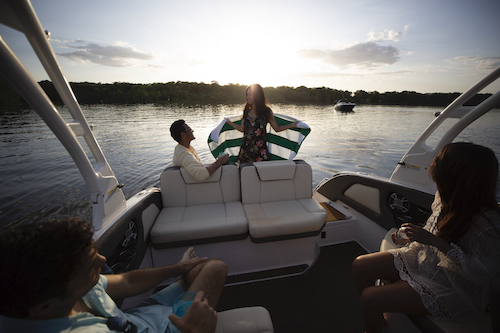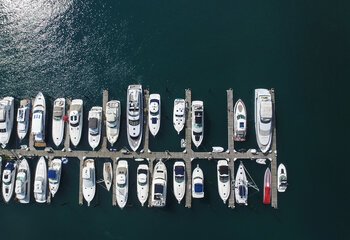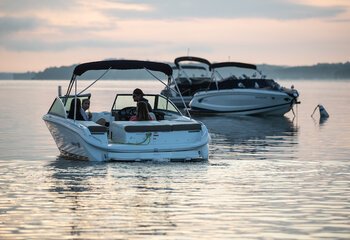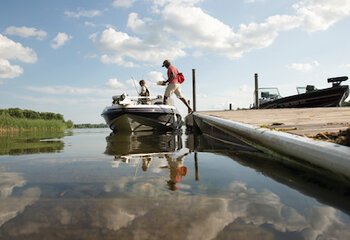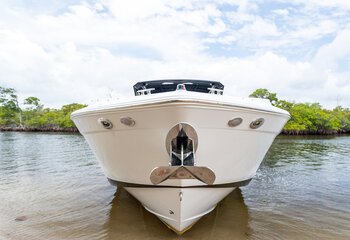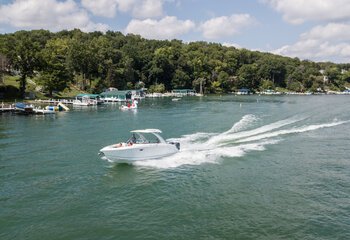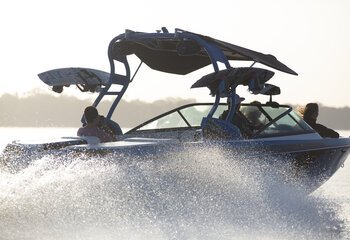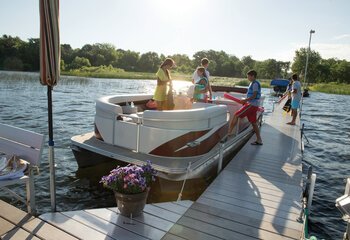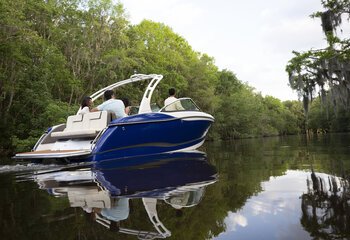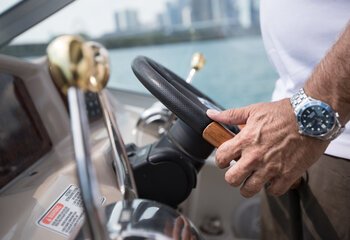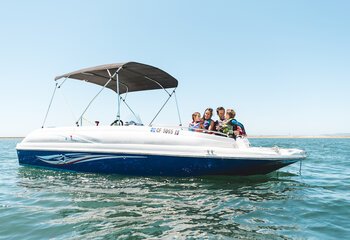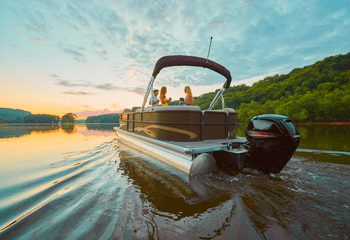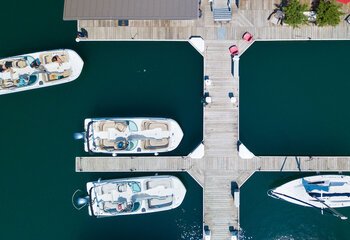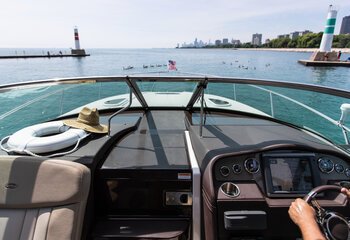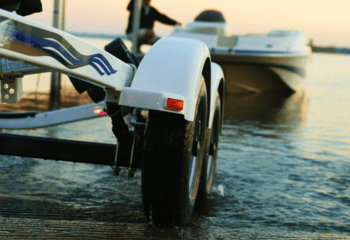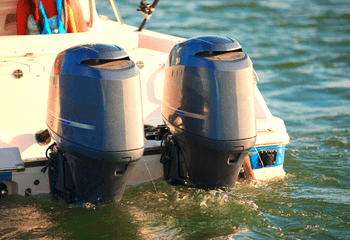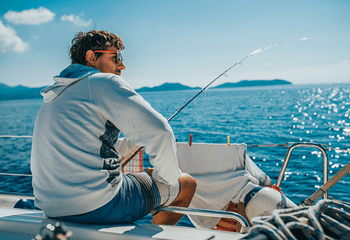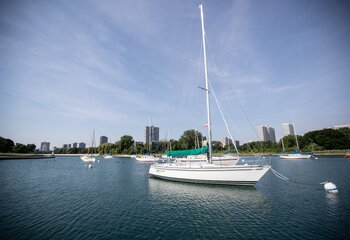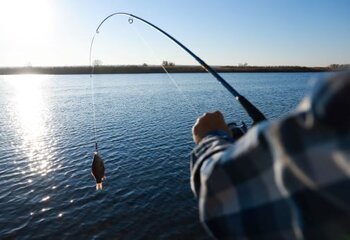Boat Buyer's Guide: How to Buy a Boat
The first step in the boat-buying process is also the most important—determining exactly what type of craft will best fit the needs and wants of both yourself and those you plan to bring along for the ride. Those needs and wants are typically determined by what type of activities you want to pursue on the water.
Think about the reasons you want to be on the water…and then narrow your choices accordingly. Our Boat Finder Tool can help with this. You may also be interested in learning more upfront about the overall costs of boat ownership.
Before we dive into the details, let's breakdown the process of how to buy a boat step-by-step...
- Choose the right boat type for your needs.
- Decide if you'd like to buy a new or used boat.
- Ensure the boat you're buying is a certified boat.
- Determine how much boat you can afford—our boat loan calculator can help.
- Research information about boat financing and how to get a boat loan.
- Shop for your boat—figure out where and when to buy.
- Learn more about boat values and pricing, including how to negotiate your purchase.
- Conduct a sea trial and a marine survey.
- Close the deal—find out more about boat registration, insurance and taxes.
Buying Your First Boat Guide
So you’re ready to take the plunge and buy a boat. Download our step-by-step beginner’s guide to get up to speed on all the basics.
Determine What Type of Boat To Buy
Now that you have decided to embrace the boating lifestyle, you'll want to establish a budget so you can start building and prioritizing your wish list. That budget will likely be a key factor in the decision to buy a new or pre-owned boat. Either way, the considerations for size and type of boat will be the same.
When it comes to determining the right size for your boat, there are a number of factors to consider:
- People: How many people will you regularly have on board? Will you host just your immediate family or will you bring extended family and friends?
- Towing: If you are trailering your boat, keep in mind that the size of boat will directly impact the size of the vehicle needed to tow it.
- Location: Think about where you’ll be using the boat. If you’re planning to boat on larger waterways, then a slightly larger boat with a deeper hull might make more sense. Smaller waterways or shallow water might require a smaller vessel.
- Storage: If you are storing your boat at the marina, boat size will likely impact monthly storage costs. If you are storing it at your personal dock, what space constraints already exist? You’ll also want to talk to your dealer or marina manager about the potential need for winter storage.
Learn more by reading Choosing the Right Boat Type: Buying Guide for Recreational Boating.
Set Your Budget
Boating is more affordable than you think. With an idea of the type of boat you want to purchase, narrow things further with several practical considerations that can help you set your budget.
A new boat has both factory freshness and a warranty; a pre-owned craft may need to be checked out more thoroughly, but allow you to stretch your budget. If you consider all of the weekend activities and vacation expenses a small family can incur throughout the year, boat ownership is quite comparable—especially when you realize that a brand-new entry-level boat can easily be had for $250 to $300 per month. To get a little more boat for the budget, you might also consider buying a pre-owned boat.
Use our Boat Loan Calculator to see how a boat fits into your budget, and be sure to read Costs of Boat Ownership to learn more about the overall costs.
Explore Boat Financing Options
Start Shopping
With a boat and budget in mind, it's time to start the shopping process. Start with a general online search of boat types, then hone in on individual models through manufacturers websites, dealerships, online reviews, and forums. Don’t just rely on the keyboard. You may also have friends or acquaintances with similar types of boats or who enjoy similar activities. Ask them their experiences, and use their firsthand knowledge to your advantage.
Dealership Experience
For many boat buyers, it's important to be able to feel, touch, and see the boat that they are purchasing. Working with a dealer can help make the buying process easy and simple. While you’re comparing boats, don’t forget to compare boat dealers. The quality and location of the dealership is an important part of your boat-buying and ownership experience.
While you’re comparing boats, don’t forget to compare boat dealers. The quality and location of the dealership is an important part of your boat-buying and ownership experience.
Learn More: Certified Dealers Guide
Inspect the Boats
Once you narrow down your search and are seriously considering one particular boat, it’s important to have a thorough inspection of other major components such as the engine, propeller, bilge (inside a boat’s hull), steering system, electrical systems and fuel tank.
Sea Trials
Take a test drive or sea trial. Think long term—the boat you test with just two people may handle much differently with a full complement of family and friends. Likewise, that horsepower that seems adequate in a simple trial may not fit the bill down the road.
Marine Surveys
If you aren’t confident in your technical knowledge, you can enlist the help of an independent marine surveyor. Very similar to a home inspector, a surveyor will inspect the boat from top to bottom and inside out so you know exactly what condition the boat is in.
Close the Deal
When it comes to the purchase process, there is more to know than the list price and features of a boat.
Final Costs
Not unlike car buying, there are often a few additional costs not listed on the sticker price. Dealer fees, insurance, registration, accessories, storage and upkeep should all be discussed with the dealer early in your shopping to determine the full cost of boat ownership and to avoid surprises later.
Bells and Whistles
Ask about accessories. Some gear, such as a safety kit, is often included with the purchase of the boat, while other activity-specific accessories might need to be added on to your purchase.
Delivery and Ownership
Find out what to expect after you sign on the dotted line. What is the delivery process? You’ll want a thorough review of the boat’s systems before taking the keys so you have the confidence to operate your boat from day one. You should also ask about the procedure for scheduling maintenance or repairs with the dealer’s shop when the time comes. Get a head start by learning more about the first year of maintenance.
And before you depart on your first outing, find out where you can take a boater-education course. Learning basic seamanship skills and absorbing some local knowledge will give you a greater confidence level once you hit the water. Completion of boater-education courses might also get you a discount on your insurance.
Ownership Guide
Finally, it's time to enjoy your purchase. Get out on the water and have fun, not just in the immediate future but in the months and years to follow. One key component of that fun is regular maintenance to keep your boat in tiptop running condition, from a regular wash and wax to scheduled maintenance. Another is to expand your boating knowledge, whether through one of many fun programs offered by local dealers or an online resource.
Ignite a lifelong passion for boating…and make memories that will last a lifetime.
Latest Wave of Boating News & Resources
Inspirational stories, how-to articles, and expert tips for new & experienced boaters

